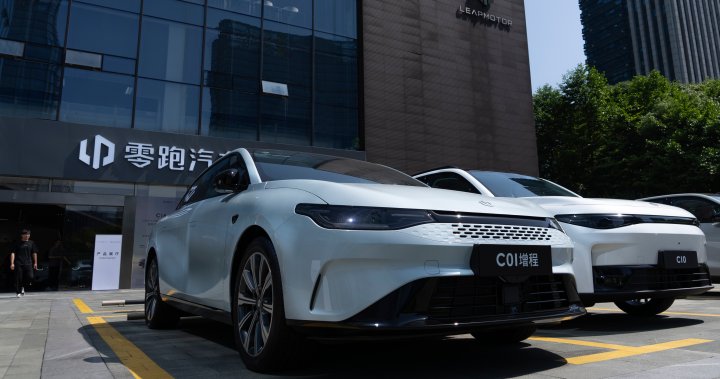Canada is looking at the massive new U.S. import tariffs on Chinese-made electric vehicles imposed by President Joe Biden earlier this month, but is not making any commitment to following suit north of the border.
Chinese brands are not a major player in Canada’s EV market at the moment but imports from China have exploded in the last year as Tesla switched from U.S. factories for its Canadian sales to its manufacturing plant in Shanghai.
And the Canadian Vehicle Manufacturers’ Association says Chinese EV makers have already made big inroads in Europe and are looking to North America next.
“That potentially is on the horizon,” said CVMA President Brian Kingston in an interview with The Canadian Press.
He isn’t advocating for Canada to match the tariffs specifically, noting the risk of Chinese retaliation. But he said Canada can’t get too out of step with the U.S.
“We always have to align our policy,” said Kingston.
President Joe Biden moved May 14 to quadruple the U.S. import tariff on Chinese-made EVs to 100 per cent. He cited unfair subsidies from the Chinese government to Chinese EV makers. He is also hiking tariffs on a lengthy list of other Chinese products including solar cells, computer chips, medical equipment and lithium ion batteries.

Canada currently imposes a six per cent tariff on Chinese-made vehicles, but the cars do qualify for up to $5,000 in federal rebates for EV purchases.
Prime Minister Justin Trudeau, Industry Minister François-Philippe Champagne and Trade Minister Mary Ng have all nudged open the door to the notion of tariffs since the U.S. made its move but none of them committed to following suit.
Breaking news from Canada and around the world
sent to your email, as it happens.
“We’re watching very closely what the Americans are doing,” Trudeau said in Philadelphia on May 21, shortly after he met with U.S. vice-president Kamala Harris on the sidelines of the Service Employees International Union convention.
Economic ties and supply chains formed a key part of that conversation according to Trudeau’s staff. Canada and the U.S. have been aligning their EV industries in recent years, including critical minerals, batteries and EV manufacturing itself.
And Canada has massively invested in the EV industry, with $30 billion laid out in just the last two years for EV battery and vehicle manufacturing sites for Stellantis, Volkswagen and Honda.
The effort is in large part an attempt to keep China from making a dent in North America’s storied auto industry. The sector accounts for almost five per cent of the U.S. economy and more than two per cent in Canada.
Nearly 10 million Americans and 500,000 Canadians are employed directly or indirectly in the auto industry.
Going forward, EVs are forming an ever-growing part of that sector, with Canada mandating one-fifth of all sales must be EVs by 2026, three-fifths by 2030 and 100 per cent by 2035,
Fully electric and plug-in hybrid vehicles accounted for almost 11 per cent of total new vehicle registrations in 2023 in Canada, up from eight per cent in 2022.

The U.S. wants about one-third of its new vehicle sales to be electric by 2032 but Canada hasn’t mandated it.
Kingston said currently, Canada’s industrial policy is out of line with the U.S. on a number of fronts, including the EV sales mandate, which he wants to see end. But he said Canada’s industrial strategy at the moment has no concern for where EVs are made.
“That’s a problem,” said Kingston.
While Chinese car companies aren’t selling in North America currently, the cheaper price of comparable EVs has seen market share in Europe jump substantially.
A Chinese MG4 EV in Germany starts at about C$42,000, compared with a similar Volkswagen ID3 EV, which starts at almost C$60,000.
Chinese car brands accounted for four per cent of the EV market share in Europe in 2022, up from less than 0.5 per cent in 2019. An analysis by the European advocacy group Transport & Environment suggests it will reach 11 per cent market share in Europe this year and 20 per cent by 2027.
Last October, European Commission President Ursula von der Leyen launched an investigation of Chinese EV subsidies with a view to enacting import tariffs.
“Fair competition is good,” von der Leyen said in March.
“What we don’t like is when China floods our market with massively subsidized electric cars. And we have to tackle this, we have to protect our industry.”

Kingston said Canada should consider its own anti-dumping investigation of China’s EV subsidy practices ahead of the arrival of Chinese EVs in the Canadian market.
Canada doesn’t need to match the U.S. tariffs immediately, but should be prepared to do so if things change, said Kingston.
“We absolutely need to be ready for a surge in Chinese EVs,” he said. “We should make sure we have the lever to pull in the event that we have to increase tariffs.”
Prior to 2023, Chinese-made electric vehicles accounted for a very small portion of Canada’s market, with $84 million in imports from China marked in 2022, or 1.2 per cent of the total value of all electric vehicle imports.
In 2023 however, as Tesla shifted its vehicles produced for Canada from California to China, that jumped to $2.2 billion. Tesla accounts for almost one-third of the Canadian EV market share currently.
That put China second behind only the U.S. at $2.8 billion in imports.
Tesla made the change because it needed to revert most of its American sales to its U.S. factories to ensure they qualified for a lucrative tax credit that is only available to EVs manufactured in North America.





